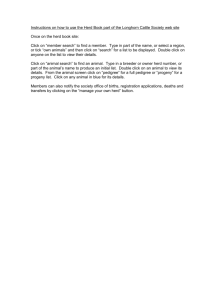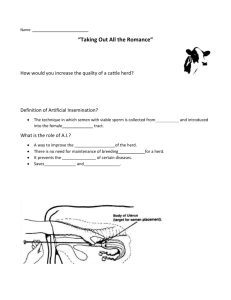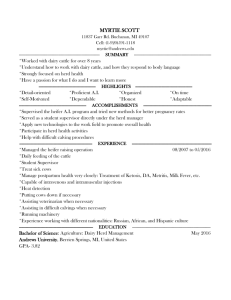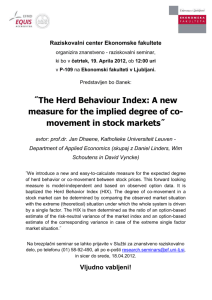Document 14176648
advertisement
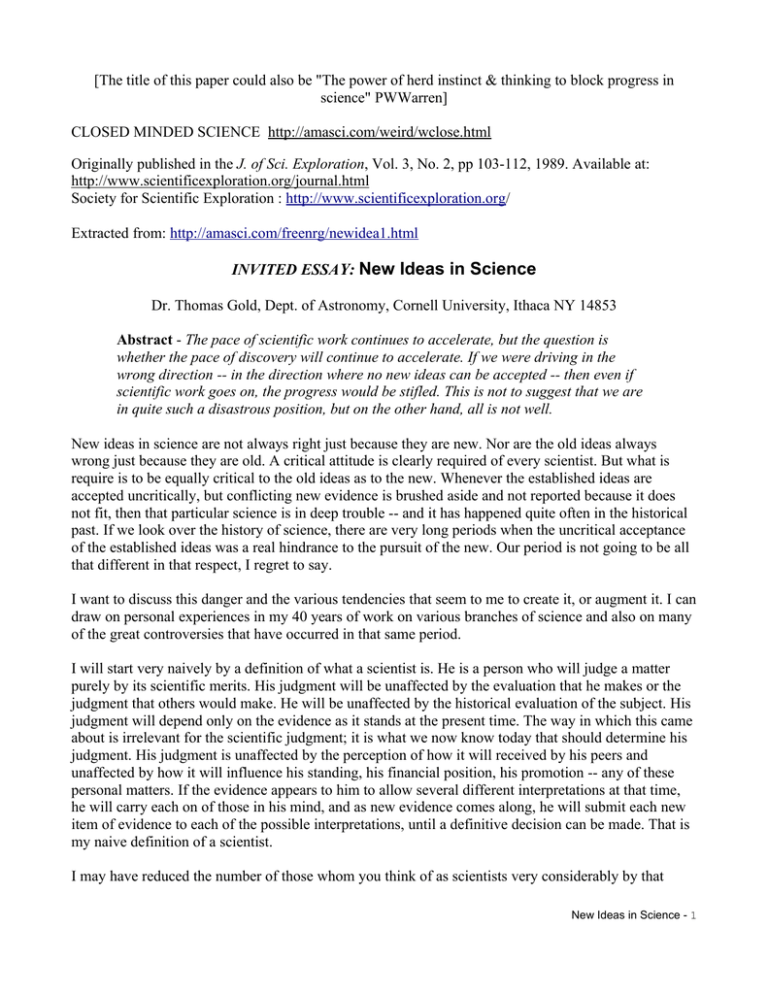
[The title of this paper could also be "The power of herd instinct & thinking to block progress in science" PWWarren] CLOSED MINDED SCIENCE http://amasci.com/weird/wclose.html Originally published in the J. of Sci. Exploration, Vol. 3, No. 2, pp 103-112, 1989. Available at: http://www.scientificexploration.org/journal.html Society for Scientific Exploration : http://www.scientificexploration.org/ Extracted from: http://amasci.com/freenrg/newidea1.html INVITED ESSAY: New Ideas in Science Dr. Thomas Gold, Dept. of Astronomy, Cornell University, Ithaca NY 14853 Abstract - The pace of scientific work continues to accelerate, but the question is whether the pace of discovery will continue to accelerate. If we were driving in the wrong direction -- in the direction where no new ideas can be accepted -- then even if scientific work goes on, the progress would be stifled. This is not to suggest that we are in quite such a disastrous position, but on the other hand, all is not well. New ideas in science are not always right just because they are new. Nor are the old ideas always wrong just because they are old. A critical attitude is clearly required of every scientist. But what is require is to be equally critical to the old ideas as to the new. Whenever the established ideas are accepted uncritically, but conflicting new evidence is brushed aside and not reported because it does not fit, then that particular science is in deep trouble -- and it has happened quite often in the historical past. If we look over the history of science, there are very long periods when the uncritical acceptance of the established ideas was a real hindrance to the pursuit of the new. Our period is not going to be all that different in that respect, I regret to say. I want to discuss this danger and the various tendencies that seem to me to create it, or augment it. I can draw on personal experiences in my 40 years of work on various branches of science and also on many of the great controversies that have occurred in that same period. I will start very naively by a definition of what a scientist is. He is a person who will judge a matter purely by its scientific merits. His judgment will be unaffected by the evaluation that he makes or the judgment that others would make. He will be unaffected by the historical evaluation of the subject. His judgment will depend only on the evidence as it stands at the present time. The way in which this came about is irrelevant for the scientific judgment; it is what we now know today that should determine his judgment. His judgment is unaffected by the perception of how it will received by his peers and unaffected by how it will influence his standing, his financial position, his promotion -- any of these personal matters. If the evidence appears to him to allow several different interpretations at that time, he will carry each on of those in his mind, and as new evidence comes along, he will submit each new item of evidence to each of the possible interpretations, until a definitive decision can be made. That is my naive definition of a scientist. I may have reduced the number of those whom you think of as scientists very considerably by that New Ideas in Science - 1 definition. In fact, I may have reduced it to a null class. But, of course, we have to be realistic and realize that people have certain motivations. The motivation of curiosity is an important one, and I hope it is a very important once in most scientists' minds. But I doubt that there are many scientists to whom the motivation of curiosity about nature would suffice to go through a lifetime of hard struggle to uncover new truths, if they had no other motivation that would drive them along that same path. If there was no question about appealing to one's peers to be acknowledged, to have a reasonably comfortable existence, and so on, if none of this came into the picture, I doubt that many people would choose a life of science. When the other motivations come into the act, of course the judgment becomes cloudy, becomes different from the ideal one, from the scientific viewpoint, and that is where the main problem lies. What are the motivations? If there are motivations that vary from individual to individual, it would not matter all that much because it would not drive the scientific community as much to some common, and possibly bad, judgment. But if there are motivations that many share, then of course that is another matter; then it may drive the whole scientific community in the field in the wrong direction. So, we must think: what are the communal judgment-clouding motivations? What is the effect of the sociological setting? Is our present-day organization of scientific work favorable or unfavorable in this respect? Are things getting worse, or are they getting better? That is the kind of thing we would like to know. The pace of scientific work continues to accelerate, but the question is whether the pace of discovery will continue to accelerate. If we were driving in the wrong direction -- in the direction where no new ideas can be accepted -- then even if scientific work goes on, the progress would be stifled. This is not to suggest that we are in quite such a disastrous position, but on the other hand, I am not going to suggest that all is well. What are the many factors that many people might share that go against the acceptance of scientifically valid new ideas? One obvious factor that has always been with us is the unwillingness to learn new things. Too many people think that what they learned in college or in the few years thereafter is all that there is to be learned in the subject, and after that they are practitioners not having to learn anymore. Of course especially in a period of fairly rapid evolution that is very much the wrong attitude; but unfortunately it is shared by many. I can give you there an example from my own experience where, when I was still very green and naive, just after the war, I had worked on the theory of hearing: how the inner ear works. As I had just come from wartime radar, I was full of signal processing methods and sophistication and receiver techniques and all that, and there I found myself discussion the physiology of hearing in those terms. I thought it was very appropriate because it is a very fine scientific instrument that we were discussing, the inner ear. But I had to address myself to an audience of otologists -- the doctors and medical people who deal with hearing -- the only ones who were doing any kind of research in this field. The mismatch was obvious; it was completely hopeless. There was no common language, and of course the medical profession just would not learn what it would take to understand the subject. On the other hand, they sure made their judgments about the matter, without having any basis at all. So it just essentially forced me out of the field. The theory of hearing which I proposed then involved an active -- not a passive -- receiver, one in which positive feedback, not just passive detection is involved. We now have very clear evidence, after these 36 years, that indeed an active receiver is at New Ideas in Science - 2 work, but we still have not got a receptive group of physiologists who deal in this field (see note below.) The medical profession still hasn't a clue as to why 15 kilocycles should be coming out of somebody's ears. Thirty-six years is not yet enough to get that learning into the profession. Since writing this, we do. I recently went to a conference on Mechanics of Hearing; NATO advanced workshop, University of Keele (UK), subject: "The Active Chochlea," July 1988. Also, there are various recent papers on the subject, including one in the Proceedings of the Royal Institution by Dr. David Kemp: "Hearing in Focus." It is now possible to record a clear, high-frequency noise coming out of people's ears, with a sensitive external receiver. The ears make clear, clean-pitched noises. They run into self-oscillation, which is clearly the symptom of an ill-controlled active receiver. A motivation which is in a way more serious and more avoidable than the nonlearning one, a motivation that hones out new ideas, is what I brutally call the "herd" instinct. It is an instinct which humans have. It presumably dates back to tribal society. I am sure it has great value in sociological behavior in one way or another, but I think on the whole the "herd instinct" has been a disaster in science. In science what we generally want is diversity -- many different avenues need to be pursued. When people pursue the same avenue all together, they tend to shut out the other avenues, and they are not always on the right ones. If a large proportion of the scientific community in one field is guided by the herd instinct, then they cannot adopt another viewpoint since they cannot imagine that the whole herd will swing around at the same time. It is merely the logistics of the situation. Even if everybody were willing to change course, nobody individually will be sure that he will not be outside the herd when he does so. Perhaps if they could do it as neatly as a flock of starlings, they would. So this inertia-producing effect is a very serious one. It is not just the herd instinct in the individuals that you have to worry about, but you have to worry about how it is augmented by the way in which science is handled. If support from peers, if moral and financial consequences are at stake, then on the whole staying with the herd is the successful policy for the individual who is depending on these, but it is not the successful policy for the pursuit of science. Staying with the herd to many people also has an advantage that they would not run the risk of exposing their ignorance. If one departs from the herd, then one will be asked, one will be charged to explain why one has departed from the herd. One has to be able to offer the detailed justifications, and one's understanding of the subject will be criticized. If one stays with the herd, then mostly there is no such charge. "Yes, I believe that because doesn't everybody else believe that?" That is enough justification. It isn't to me, but it is to very many other people. The sheep in the interior of the herd are well protected from the bite in the ankle by the sheep dog. It is this tendency for herd behavior that is greatly aggravated by the support structure of science in which we believe nowadays. I will read out just one passage here to show that other people than myself have recognized the herd problems: David Michland writes in the Reviews of Astronomy: I sometimes wonder if the much encouraged and proclaimed interaction among western astronomers leads to a form of mental herd behavior which, if it does not actually put a clamp upon free thinking, insidiously applies the pressure to follow the fashion. This New Ideas in Science - 3 makes the writings of our Soviet colleagues who have partly developed ideas in comparative isolation all the more valuable. Yes, I have wondered whether one should in fact pursue subjects with a big wall between two groups that are working in the same field, so that they absolutely cannot communicate, and see a few years later whether they come even approximately to the same conclusion. It would then give some perspective of how much the herd behavior may have been hurting. But we don't have that. Even with our Soviet colleagues, unfortunately, we have too much contact to have a display of real independence, to see where it would have led. This question of how the support of science -- and I don't mean only the financial support but also the journals, the judgment of referees, the invitations to conferences, acknowledgments of every kind -how that interacts with the question of herd behavior, is what I will now discuss. It is important to recognize how strong this interaction really is. Suppose that you have a subject in which there is no clear-cut decision to be made between a variety of opinions and therefore no clear-cut decision to be made in which direction you should put money or which direction you should favor for publications, and so on. No doubt opinions would need a multidimensional space to be presented, but I will at the moment just represent them in a one-dimensional situation. Suppose you have some curve between the extreme of this opinion and the extreme of that opinion. You have some indefinite, statistically quite insignificant distribution of opinions. Now in that situation, suppose that the refereeing procedure has to decide where to put money in research, which papers to publish, and so on. What would happen? Well, people would say, "We can't really tell, but surely we shouldn't take anybody who is out here. Slightly more people believe in this position than in any other, so we will select our speakers at the next conference from this position on the opinion curve, and we will judge to whom to give research funds," because the referees themselves will of course be included in great numbers in some such curve. "We will select some region there to supply the funds." And so, a year later what will have happened? You will have combed out some of the people who were out there, and you will have put more people into this region. Each round of decision making has the consequence of essentially taking the initial curve and multiplying it by itself. Now we understand the mathematical consequence of taking a shallow curve and multiplying it by itself a large number of times. What happens? In the mathematical limit it becomes a delta function at the value of the initial peak. What does that mean? If you go for long enough, you will have created the appearance of unanimity. It will look as if you have solved the problem because all agree, and of course you have got absolutely nothing. If no new fact has come to light and the subject has gone on for long enough, -- this is what happens. And it does happen! I am presenting it in its clearest form, and it is by no means a joke. If many years go by in a field in which no significant new facts come to light, the field sharpens up the opinions and gives the appearance that the problem is solved. I know this very well in one field, which is that of petroleum derivation, where the case has been argued since the 1880's. At the present time most people would say the problem is completely solved, though there is absolutely nothing in the factual situation that would indicate a solution. It is also very clear there that the holding-in that has taken place has been an absolute disaster to research. It is now virtually impossible to do any research outside the widely accepted position. If a young man with no New Ideas in Science - 4 scientific standing were to attempt this, however brilliant he might be, the wouldn't have a hope. I believe that our present way of conducting science is deeply afflicted by this tendency. The peer review system, which we regard as the only fair way we know of to distribute money (I don't think it is, but it is generally thought to be) is an absolute disaster. It is a completely unstable method. It is completely prone to this tendency; there is no getting out of it. The more reviews you require for a proposal -- now the NSF [National Science Foundation] requires seven reviewers for a proposal -- the more you require, the more certain it is that you will follow the statistical tendency dictated by this principle. If you had noise in the situation, it would be much better. There used to be in the United States many different agencies, and there was perhaps an odd-ball over here who gave out some money for one agency, and a funny fellow over there for another. This was a noisy situation, and it was not driving quite as hard towards unanimity. But now we have it all streamlined and know exactly to whom we have to go for a particular subject and, of course, it is an absolute disaster. Why is it thought that the peer review system would work for science? How about trying to make a peer review system work for other forms of endeavor? Suppose we had a national foundation for the arts, and every painter had to apply to it to get his canvas and his brushes and his paints. How do you suppose that would work? I can imagine some of the consequences, but better than that, we can look them up in historical examples. If you want to read such, in the book The Experts Speak, you can do that. There is a long list of them that you can read -- it makes marvelous reading. Eduard Manet wrote to his colleague Claude Monet, of Renoir: "He has no talent at all, that boy. Tell him to give up painting." "Rembrandt was regarded as not comparable with an extraordinarily gifted artist, Mr. Ripingill." William Blake spoke of Titian and the Venetians as "such idiots are not artists." Degas regarded Toulouse-Lautrec" as merely a painter of a period of no consequence." One wonders how art would have fared in a peer review system. Or would it be different in music? We can read what was said of Beethoven's compositions by musicians of his time: "An orgy of vulgar noises" was the verdict of Beethoven's Fifth Symphony by Mr. Spore, a German violinist and composer. On Tchaikovsky's appreciation of Brahms, "I played over the music of that scoundrel Brahms. What a giftless bastard. It annoys me that this jumping, inflated mediocrity is hailed as a genius." But one could go on almost endlessly with such quotations. Music would not have fared any better. So we see that the herd instinct is a tendency in the human makeup, which is itself a severe handicap for science. Instead of combating it as best we can, we have arranged a method of nurturing science which actually strengthens it enormously -- makes it virtually impossible to depart from the herd and continue to have support, continue to have a chance of publication, continue to have all the advantages New Ideas in Science - 5 that one requires to work in a field. If in a subject there was initially a diversity of opinions, the review system will assure a very short life for that condition, and soon the field will be closed to all but those who are in the center. Once a herd is established, by whatever historical evolution this has come about, it obtains such firm control that it is extremely difficult to do anything about it. And even if it were appreciated that that is the situation, one just doesn't know how to interfere. Where then is the right to free speech if every journal has to send each article out to a number of people to review, and the bulk of the people are with the herd? Usually with just one-third of the reviewers very negative, the paper does not get published. So there is no free speech in the sense that you cannot publish diverse viewpoints. There is also no free speech at conferences because the same is true there. Would all those who have a divergent opinion be able to organize their own conference? Very rarely. We (note: meaning the SSE) represent perhaps an example here showing that it is possible, but it is pretty rare that one can raise funds to run conferences. Essentially once the herd is established, it will interfere in any one of the activities that one would need to further that science. Would the Dean of a university be willing to promote somebody to tenure who was outside the pack? He can't, because he has to send out letters to the leading persons in the field -- he may inquire from 20 people before he gets permission to appoint somebody to tenure -- and how can he get that when the pack is running in another direction than this person? It is absolutely hopeless! So you establish the situation more and more. Once a herd has been established in a subject, it can only be broken by the most crass confrontation with opposing evidence. There is no gentle way that I have ever seen in the history of science where a herd once established has been broken up. In many subjects such clear evidence is very hard to come by. In the complex subjects, especially I always think of the earth sciences in this respect, there are always different ways of interpreting any one fact; so many complicated things have taken place that any one fact can have three or four interpretations and the crass confrontation is very rare. So then when you have a herd, all the money that you spent on it may be wasted, or worse than that, it may actually serve to cement further the bad situation. So it is very likely that money is often spent in science in a way that is absolutely detrimental to that science. What does the refereeing procedure really look like? How does it really go on? If, for example, an application was made in the early 60's or late 50's suggesting that the person wanted to investigate the possibility that continents are moving around a little, it would have been ruled out absolutely instantly without questions. That was crack- pot stuff, and had long been thought dead. Wegener, of course, was an absolute crack-pot, and everybody knew that and you wouldn't have any chance. Six years later you could not get a paper published that doubted continental drift. The herd had swung around -- but it was still a firm and arrogant herd. Shortly after the discovery of pulsars I wished to present an interpretation of what pulsars were, at this New Ideas in Science - 6 first pulsar conference -- namely that they were rotating neutron stars. The chief organizer of this conference said to me, "Tommy, if I allow for that crazy an interpretation, there is no limit to what I would have to allow." I was not allowed 5 minutes of floor time, although I in fact spoke from the floor. A few months later, this same organizer started a paper with the sentence, "It is now generally considered that pulsars are rotating neutron stars." I will tell you about a recent application to the Department of Energy [DOE] by a colleague of mine and myself for some money to investigate the chemistry of hydrocarbons at high pressures and high temperatures in the conditions in which they might be at some depth in the earth. We had the referee's reports because you are allowed to get them, but not signed. We got one voluntarily from one of the referees, so we know who he was. He wrote, "This proposal must be funded. In science every research project is a risk, but here the risk is negligible because even if the hypothesis is not correct, this research proposal will contribute strongly to fundamental science in petroleum engineering, the thermodynamics of fluids, and geochemistry. If the hypothesis is correct, the Department of Energy will have hit the jackpot beyond its wildest imagination." And he continued with the detailed questionnaire with top marks in every part: the competence of the proposer, the institution, the test, the facilities, and all that. He gave it top marks on every point. There was a second referee who also gave it top marks for all the questions that are posed on the form. But then the last question is: "Should this proposal be funded?" and he wrote, "No." And then there was just a single word after that where it said "If no, why not?" And he wrote down, "Misguided." It was not funded despite the fact that most of the referees in fact gave it very high marks, due to the "misguided," and also similar words were used by two or three other referees. No reason given; just "don't touch it." It wasn't the only such that I have submitted over the years now, and they have all been turned down both at NSF and DOE [Department of Energy]. It is absolutely hopeless to get any money in contravention of the opinions that are so firmly established in the petroleum business now. That brings me to another problem. If in a subject you have a large number of people because it has economic applications, that immediately aggravates the problem. And, of course, in petroleum related matters there are a huge number of people involved at every step. This means firstly that a lot of mediocrity is brought into the field and overpowers the field by sheer numbers; and it also means that much more commitment to a particular viewpoint has been made by many people. Do you suppose that the petroleum geologist who has been advising Exxon to drill for hundreds of millions of dollars for maybe 30 years, will go to his bosses at Exxon and say, "I am sorry, Sir, but I have been wrong all those years. We have been finding the petroleum, but if we had searched for it in another way, we would have found 10 times as much." It is very unlikely that they will do that. In fact, even if his methods and his understanding were completely, clearly wrong -- even if you had the crassest confrontation in this case -- I don't think that it would be acknowledged. A very small proportion of people would have that stature that they would turn around and say, "All my life I have taught or struggled with these problems on the wrong lines, and now I understand the right thing." So, in this case, the herd is so firmly established that one cannot think of converting it. A quotation from Tolstoy comes to mind: I know that most men, including those at ease with problems of the greatest complexity, can seldom accept even the simplest and most obvious truth, if it be such as would New Ideas in Science - 7 obliged them to admit the falsity of conclusions which they have delighted in explaining to colleagues, which they have proudly taught to others, and which they have woven, thread by thread, into the fabric of their lives. Another area where it is particularly bad is in the planetary sciences where NASA [National Aeronautics and Space Administration] made great mistakes in the way in which they set up the situation. NASA made the grave mistake not only of working with a peer review system, but one where some of the peers (in fact very influential ones) were the in-house people doing the same line of work. This established a community of planetary scientists now which was completely selected by the leading members of the herd, which was very firmly controlled, and after quite a short time, the slightest departure from the herd was absolutely cut down. Money was not there for anybody who had a slightly diverging viewpoint. The conferences ignored him, and so on. It became completely impossible to do any independent work. For all the money that has been spent, the planetary program will one day be seen to have been extraordinarily poor. The pictures are fine and some of the facts that have been obtained from the planetary exploration with spacecraft -- those will stand but not much else. So yes, it is possible to make what is a bad tendency in humans in the first place (for science at least a bad tendency,) that much worse with a lack of understanding of how the inward looking effect can be controlled or at least how it should not be augmented by the method of nurturing of science. You may think that what I am saying is that the support for science poses this intrinsic problem, and that if you want to be fair you have to go for an unstable system which doesn't work. At first it looks like that. So should you go for something that's fair -- makes people reasonably happy -- but that doesn't work? Or should you go for something that is not so obviously regarded as fair but does work? It is a difficult decision to make, but you know there is nothing that says that things that are fair must also be the things that work. The world is just not so benign to us. Life is not that easy. Is there another way of doing it? I suppose that the best that I can think of is roughly on the lines of what my friend, Arthur Katrowitz proposed at least for major decisions: The "science court" idea is the best one. Where a lot is at stake, where a subject has been driven into an alley, one must set up a science court where the different viewpoints would be heard, would be argued by the protagonists of each one, with carefully prepared work. The different viewpoints could be judge, not by others working in that same field, which would merely take you back to the herd, but would be judged by a group of very knowledgeable and very competent scientists distributed over other fields, but with enough general competence to be able to listen and understand the detailed arguments of the field in question. I would be much happier to have subjects surveyed every now and again by a jury of that kind. It has to be a scientific jury because it would have to understand detailed scientific arguments, but they do not have to be -- and should not be -- from the field in which the decision is to be made. That is the avenue which I would advise the NSF and such organizations to pick at this time. I would say that in every field they should set up such a science court to hear all the different opinions on a reasonably regular basis. It is true that you cannot do it for every application that comes along, but it is true that you could do it sufficiently often for major decisions to break, or at least spoil somewhat, the herd system. As it is at the moment, the situation seems not to be understood at all. I have discussed the herd problem with many people in the funding agencies, and found no understanding of that problem at all. New Ideas in Science - 8 I could give you many more examples from my own life of the difficulties of getting subjects funded. At the present time I am struggling with the oil and gas business, and after being turned down very firmly by DOE and NSF, I finally was able to get money from he gas industry itself to do research which is in good progress now. In this area, which is one of the worst because no really significant facts have come to light and everything has been interpreted time and again in the time-honored fashion, and everyone believes they know in detail now how oil and gas come to be where they are. And the fact that we find that oil and gas exist on the other planetary bodies, obviously not due to biology, is completely ignored. They say there was no oil or gas here, and all that happened on the Earth was something that was completely specific to Earth. Of course, it is a peculiar attitude, but that is one that is widely accepted. There is one more point I should make. When in a subject a general attitude or a viewpoint has become established, then it is very easy to obtain funds to do work in that subject on the bases of what I call "shoehorn science." I think you will understand what I mean by that. If you make your proposal which says: "I will demonstrate how this fact and that fact, that apparently are difficult to see in the accepted framework, can be figured into that framework," they are all delighted to give you money. And by the time that has gone on for a long time, so much work of the shoehorn kind has been diligently done to force the facts into the pattern that is preordained, that it then looks to many people as if it all was firmly established. What happens is that they build a superstructure on what may be no foundation -- if I may invent a "Confucius say" sort of proverb, "Never judge the strength of foundation by size of building." In the field of petroleum geology that is really what has happened. The moment you dare to look a the foundation, you are a scoundrel. I have made people absolutely wild, shaking their fists at me, when I proposed in my talks that there was some uncertainty about the origin of petroleum. One fellow actually wrote a paper that got published, that there must be life on Jupiter because hydrocarbons have been seen on Jupiter. That is my sad story. I believe that we could do something about it, that we could propose that this kind of a situation be understood in high quarters -- that we could try and have something in the nature of science courts established, or at any rate some review by independent persons and not by the herd; but as it is at the moment, I feel that we are dealing with a large proportion of science funding very firmly in the wrong hands, and much of it is therefore counterproductive. New Ideas in Science - 9
